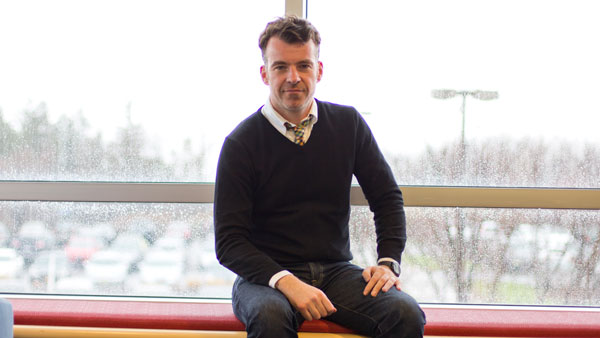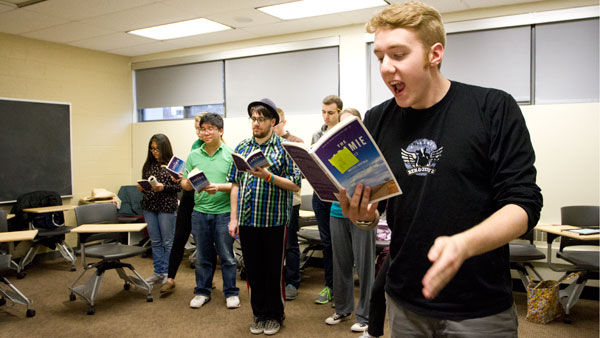Unexpected, personal and eclectic. These three words were carefully chosen as the slogan for a cinematic celebration reflecting not only one country, but the thousands of years of history and culture that country represents.
The Israel Film Festival, hosted by Hillel at Ithaca College, the Jewish Studies Program, the Roy H. Park School of Communications and the Center for Academic Excellence, will take place March 1–2. The festival will explore the theme of multiculturalism through three distinctive, modern Israeli films: “The Ballad for Weeping Spring,” “Flood” and “Garden of Eden.”
Mirit Hadar, professor in the Department of Modern Languages and Literatures, said her interest in bringing a festival to the college was piqued when she saw Israeli films at other film festivals over the past few years and was interested in spreading their messages to a broader audience.
“I go to the other Israeli film festival [in New York City] every year,” she said. “I am very interested in what Israeli film can offer the world.”
When Igor Khokhlov became the director of Hillel this past summer, he and Hadar soon recognized their shared dream of exposing the college to Israeli film, he said.
“In the first meeting I had with Mirit, simultaneously we both said, ‘We want to bring in a film festival!’” Khokhlov said.
Israeli Culture Through Films, a course taught by Hadar, quickly became a favorite among students.
“Students are interested to learn about the conflict happening there,” Hadar said. “They want to know more about the diverse population in Israel, and that’s the focus not only on the course but on the festival.”
One of her students, sophomore Eli Hayes, became involved with the festival when Hadar asked him to make an informal trailer of the three featured films.
“Not a lot of people know specifics about what’s going on in Israel,” Hayes said. “I think this is a good opportunity for kids to go and see firsthand what certain artists’ perspective is on the conflict.”
When choosing the films, the goal was both to incorporate many different elements of Israeli culture and to provide common ground for a wide range of students at the college.
“We want to show how many different layers of cultural mosaic Israel has in itself, and through these movies we are following this pattern and making sure that all of these layers are weaved in between each other,” Khokhlov said.
The first film, “The Ballad of Weeping Spring,” is a fantasy story about the formation of an orchestra, where the characters are defined by their morals, not by belonging to any race or culture. Khokhlov hopes that this film will appeal to music majors because of its focus on Israeli traditional music.
The second film, “The Flood,” explores the relationship between two brothers in modern-day Israel, the elder of whom is autistic. By dealing with issues of family strife and childhood psychology, Hadar said this film may provide a new perspective for those interested in social work or teaching.
“Garden of Eden,” the final film in the series, explores how one public park in Israel is used by a diverse range of citizens. The documentary shows the park’s role changing throughout the seasons in the lives of hasidic Jews and swanky, night-life residents of Tel Aviv alike. Even Hadar and her son appear briefly in the film, which Khokhlov said he hopes many documentary studies majors will learn from.
“The fact that it’s the Israel film festival is not the goal — the fact that we are dealing with issues of multiculturalism is what we want to emphasize,” Khokhlov said.
Following each screening, a panel will discuss one of the major themes presented in the film. Speakers include Deborah Starr, an expert in Jewish and Arab identities, associate professor of modern Arabic and Hebrew literature and film in the Department of Near Eastern Studies at Cornell University and the director of Cornell’s program of Jewish Studies; and Jessie Kranowitz ’12, program coordinator at Hillel who works with children with disabilities in the Ithaca area.
Hadar said Israeli film has recently gained attention in the international film industry, showing at many film festivals across the country.
“As we speak, these three films are being screened all over the nation in major film festivals,” Hadar said. “One of the biggest film festivals in LA is screening ‘The Ballad for Weeping Spring’ as a premiere … we are presenting the same film.”
Not only do these films have a cultural and personal value, Khokhlov said, but they are also a major part of the modern film scene.
“Israel film culture and scene exploded recently, maybe in the past five years,” Khokhlov said. “We want to make sure that as we are here, far away from most major film festivals, we can still show some of the great films here and discuss in the panels and expose people to different parts of Israel that we don’t necessarily talk about.”










